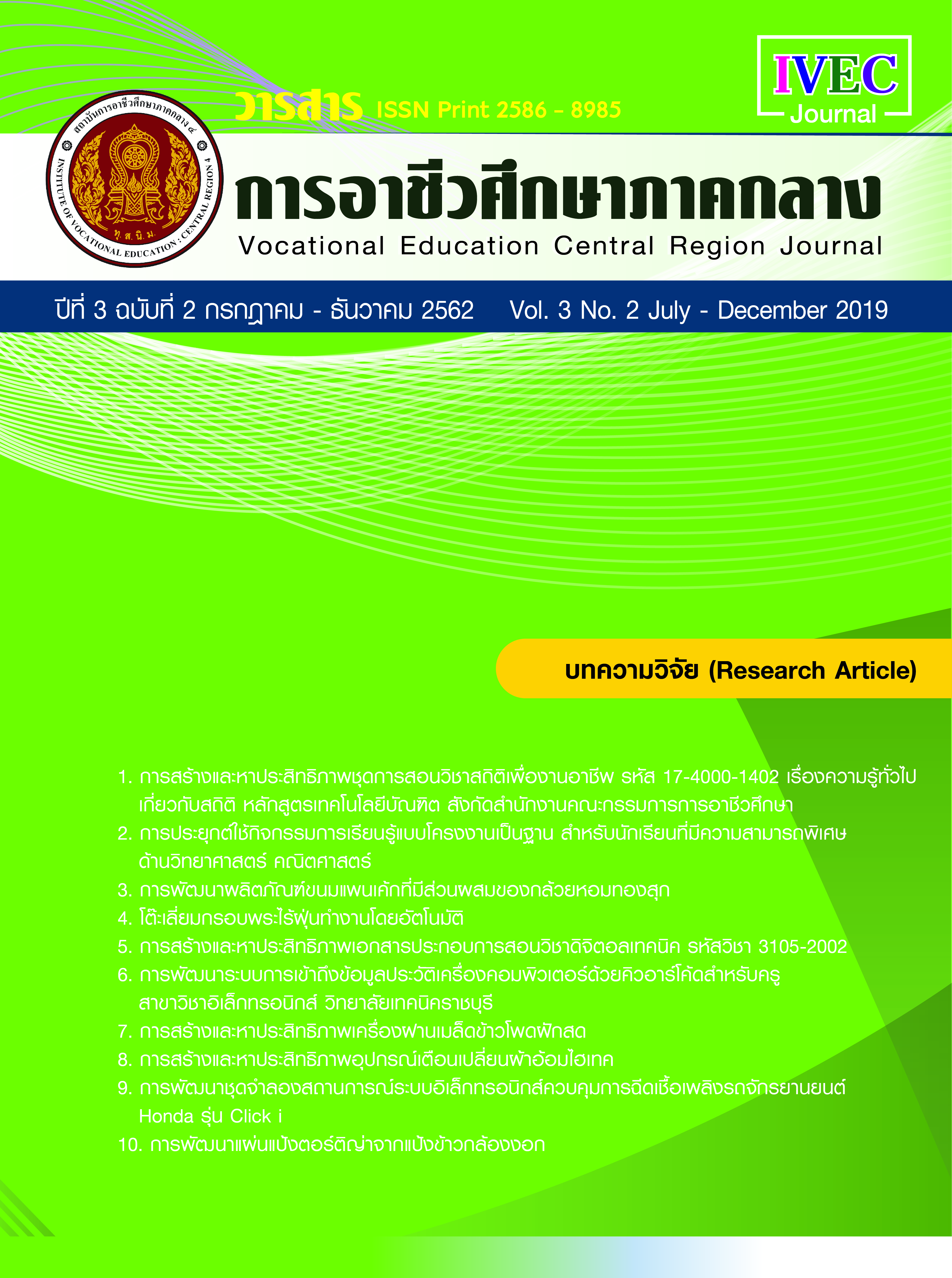Application of Project-Based Learning Activities for Special Talents Students in Science and Mathematics
Main Article Content
Abstract
The research objectives were: 1) To study fundamental of the activity on Project based learning 2) To develop of the activity on project-based learning for special Talent Students in Science and Mathematics 3) To apply the activities on Project-based learning for special Talent Students in Science and Mathematics 4) To evaluate and the activity on Project-based learning. The samples groups of this research comprised of 40 students from school of the Basic Education Commission in Chonburi province and nearby through specific sampling.
One Group Pretest-Posttest Design was employed in this study on four days training. Research instruments were training curriculum on project based learning, pretest – posttest knowledge and comprehension tests, skill valuation form and behavior evaluation form, questionnaires and performance project based learning. The statistical analysis employed were percentage, mean, standard deviation, t-test dependent and content analysis.
The results of this research were as follow:
1) The activity on project based learning required various activities, explicit evaluation and modern training media.
2) The activity on project-based learning consisted of contents 6 units were : 1) The ideas of project-based learning, 2) FAILA Model Principles, 3) Basic of innovation, 4) Activities on project, 5) Show and Share, 6) Evaluation learning.
3) The activity on project based learning were implementing with a group of 40 students from school of The Basic Education Commission in Chonburi province and nearby paid attention to training activities project.
4) As the result of the evaluation and improvement of the activity on project based learning, it was revealed that the students’ comprehension scores on project based learning before and after being trained by using the training curriculum were statistically significant different at 0.01 level. The students evaluated knowledge was strongly agree level
and opinion of training curriculum on project based learning were strongly level. The result evaluation of skill were strongly level and behavior in project were good.
Article Details
|
บทความ ข้อมูล เนื้อหา รูปภาพ ฯลฯ ที่ได้รับการตีพิมพ์ในวารสาร การอาชีวศึกษาภาคกลาง ถือเป็นลิขสิทธิ์ของวารสารการอาชีวศึกษาภาคกลางหากบุคคลหรือหน่วยงานใดต้องการนำทั้งหมดหรือส่วนใดส่วนหนึ่ง ไปเผยแพร่ต่อหรือเพื่อกระทำการใด ๆ กองบรรณาธิการไม่สงวนสิทธิ์ ในการคัดลอกบทความเพื่อการศึกษาแต่ให้อ้างอิงแหล่งที่มาให้ครบถ้วน สมบูรณ์ สงวนสิทธิ์ โดย สถาบันการอาชีวศึกษาภาคกลาง 4 ที่ตั้ง 90 ถนนเทศา ตำบลพระปฐมเจดีย์ อำเภอเมือง จังหวัดนครปฐม โทรศัพท์ 034 242 856 , โทรสาร 034 242 858 ISSN : 3056-9176 (print) ISSN : 2985-2382 (online) |
References
2. นิศา แซ่เอี้ยว. (2551). การศึกษาผลสัมฤทธิ์ทางการเรียนความสามารถในการแก้ปัญหาและเจตนคติที่มีต่อวิชาการส่งเสริมการขาย ของนักเรียนระดับประกาศนียบัตรวิชาชีพชั้นปีที่ 2 ที่เรียนโดยวิธีการสอนตามแนวทฤษฎีการสร้างองค์ความรู้ด้วยตนเอง. วิทยานิพนธ์การศึกษา มหาบัณฑิต สาขาวิชาหลักสูตรและการสอน บัณฑิตวิทยาลัย มหาวิทยาลัยบูรพา.
3. สำนักงานคณะกรรมการการศึกษาแห่งชาติ. (2542). พระราชบัญญัติการศึกษาแห่งชาติ พุทธศักราช 2542. กรุงเทพฯ: เซเว่นพริ้นติ้งกรุ๊ป.
4. สุวิทย์ มูลคำ และอรทัย มูลคำ. (2545). 20 วิธีจัดการเรียนรู้ : เพื่อพัฒนาคุณธรรม จริยธรรม ค่านิยมและการเรียนรู้โดยการแสวงหาความรู้ด้วยตนเอง. กรุงเทพฯ: โรงพิมพ์ภาพพิมพ์.
5. Benton, Ben. (2010). Superintendent praises roject-based learning. J. MeClatch-Tribune Business news. 2(2) : 89-114.
6. Campbell, L.C. (2004). Teaching and learning through multiple intelligences. (3rd ed.). New York: Pearson Education.
7. Carnevale, A.P., Gainer, L.J. & Meltzer, A.S. (1990). Workplace basics training manual. San Francisco, CA: Jossey-Bass.
8. McDowell, Michael. (2009). Group leadership in the project-based learning classroom. Docteral Dissertation University of La Vern.
9. Wexley, K.N. & Latham, G.P. (1991). Developing and training human resources in organizations. (2nd ed.). New York: Harper Collins.


